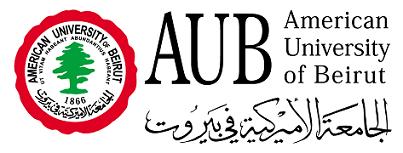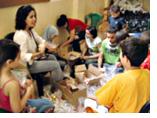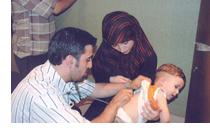American University of Beirut (Lebanon)

The American University of Beirut (AUB) was founded in 1866 as a private, independent, non-sectarian institution of higher learning, functioning under a charter from the State of New York. AUB has grown from 16 students in a rented house to a major university with over 7,446 students located on a 73-acre campus overlooking the Mediterranean Sea. The University is governed by an autonomous Board of Trustees comprised of international leaders in business, education, diplomacy, engineering, philanthropy, science, and medicine. AUB’s vision is that “Graduates will be individuals committed to creative and critical thinking, life-long learning, personal integrity and civic responsibility, and leadership.” AUB’s website>>
Civic Engagement at AUB
 AUB has long had a tradition of civic engagement and community outreach. This tradition was upheld in the wake of the July 2006 War in Lebanon when then-president Dr. John Waterbury established the AUB Task Force for Reconstruction and Community Service (TFRCS) to undertake relief and reconstruction efforts. The focus of the TFRCS is the entire University community: AUB faculty and students from all disciplines, together with staff from the main campus and the medical center, who are interested in engaging in post-war reconstruction and community service. The TFRCS plays multiple roles as:
AUB has long had a tradition of civic engagement and community outreach. This tradition was upheld in the wake of the July 2006 War in Lebanon when then-president Dr. John Waterbury established the AUB Task Force for Reconstruction and Community Service (TFRCS) to undertake relief and reconstruction efforts. The focus of the TFRCS is the entire University community: AUB faculty and students from all disciplines, together with staff from the main campus and the medical center, who are interested in engaging in post-war reconstruction and community service. The TFRCS plays multiple roles as:
- an advocate of public service
- a resource in on-going discussions within AUB about how to evaluate public service in faculty promotion
- a link between community needs, AUB’s intellectual resources, and funding sources
- an advisor to the President on spending funds designated for reconstruction
As a way of further institutionalizing civic engagement at the University, AUB has also established the Center for Civic Engagement and Community Service (CCECS ). Directed by Professor Mounir Mabsout, the CCECS operates to support community-based research initiatives, develop curricular opportunities for student service learning, organize a strong student volunteer program, integrate its activities into academic programs at the University, and foster productive working relations with project leaders in the community. Learn more about AUB’s outreach efforts>>
Student Civic Engagement
 In addition to university-sponsored civic engagement, there are a number of student clubs and societies which engage the community, including the Environmental Club, the Civic Welfare League, and the Lebanese Red Cross Club. The Civic Welfare League is one of AUB’s oldest student groups, and it focuses in particular on reducing illiteracy by holding night classes for university employees. The Red Cross Club focuses on health-related activities such as public health services, blood donation campaigns, first-aid education sessions, and fund raising for those in need. Learn more about AUB’s student clubs>>
In addition to university-sponsored civic engagement, there are a number of student clubs and societies which engage the community, including the Environmental Club, the Civic Welfare League, and the Lebanese Red Cross Club. The Civic Welfare League is one of AUB’s oldest student groups, and it focuses in particular on reducing illiteracy by holding night classes for university employees. The Red Cross Club focuses on health-related activities such as public health services, blood donation campaigns, first-aid education sessions, and fund raising for those in need. Learn more about AUB’s student clubs>>